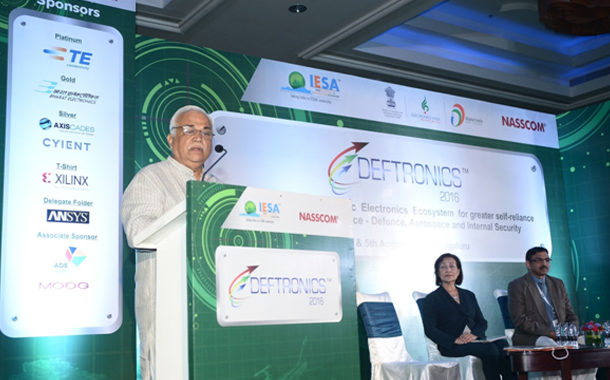Defence Electronics and System Design Policy Recommendations by IESA, NASSCOM and Roland Berger will play significant role in the formation of A&D Electronics Market
India Electronics and Semiconductor Association (IESA), representing the Indian Electronic System Design and Manufacturing (ESDM) industry, the National Association of Software and Services Companies (NASSCOM), along with Roland Berger, a leading global strategy consulting firm with immense expertise in defence, launched the Defence Electronics and System Design Policy Recommendations at DEFTRONICS 2016, the annual flagship A&D event. The recommendations are based on current aerospace, defence and internal security trends and happenings to provide guidance towards the formulation of Defence policies by the Union ministry.
The chief guest for the event was Dr. V. K. Saraswat, Member NITI Aayog and Former Chief Scientific Advisor to the Indian Minister of Defence & Director General, DRDO. Dr. V. K. Saraswat said, “India’s electronics market has been witnessing huge market in Consumer Electronics, Industrial, Communication, Strategic Electronics. Today, the size of Strategic Electronics is projected to grow to $72 Bn from the present $1.7 Bn market, and this indicates immense potential as there exists a significant gap between supply and demand. Though India is considered as a ‘Soft Power’ in the space, we are yet to witness a single Indian company that develops strong end-to-end Aerospace and Defence software solutions. As a result, we keep depending on foreign companies. The only on boarding option for Indian electronics component companies in India is to target Strategic Electronics (Defense) industry, and we should act now. We need to understand that the return on investments in the Defense Electronics industry in India is long term and the players need to have a long-term view.”
The guest of honor, H.E. Ms. Yael Hashavit, Consul General of Israel, Consulate General of the State Israel also provided her insights into the Indian defense, aerospace and the innovation in the ESDM sector with respect to her expertise relating to the Israel Defence Force.
Incidentally, IESA and NASSCOM have been given the responsibility to draft recommendations for the policy paper for Defence Electronics and System Design by the Ministry of Defence. Roland Berger has played an advisory and consultant role in the formation of the draft policy paper. The Defence Electronics and System Design Policy Recommendations symbolises the recommendations made to the Ministry of Defence.
The policy recommendations indicate that India not only needs to create world-class companies, but it is imperative to bring them in the global value chain of OEMs. It suggests that the government needs to have the vision to provide the Indian companies the required visibility, timely closure of contracts, ensure technology transfer and provide the manufacturing push through certain initiatives and incentivisation.
K. Krishna Moorthy, Chairman-IESA, said “Defense, Aerospace and Internal Security “ are not only most important for National Security perspective but also can be the biggest job generator in an economy which is growing faster than the rest of the world. With global companies investing in India and leveraging the R&D talent here to create globally competitive products amplifies the fact that we can innovate and develop products and solutions that will meet our growing demands in these verticals. We need to have polices and processes which can accelerate this through skill development, enabling a strong start up eco system which innovates and also absorbs technology which come as part of technology transfers and then develops the next generation technology here, as well as create the infrastructure for defence manufacturing powerhouse. We are glad that we are playing an important role in making India’s defence ecosystem self-reliant and independent with policy recommendations for Defence Electronics and System Design Policy.”
Speaking about the policy, R. Chandrashekhar, President, NASSCOM added, “We are required to keep pace with the innovation happening across the globe and need to start providing a stimulus to the companies in the defence electronics domain. Hence, it is really important for us to create an arrangement for technology transfer with more advanced nations and the role of the government will be significant here. They should create an environment for the domestic players to cross-pollinate knowledge and technologies with other countries.”
DEFTRONICS 2016 promises to draft a new vision for the defence space through a constructive discussion over two days, led by government officials and industry thought leaders. The first day of the event was graced by dignitaries such as Ms. Yael Hashavit, Consul General of Israel, Dr. V. K. Saraswat, and Former Chief Scientific Advisor to the Indian Minister of Defence & Director General, DRDO, international experts in Cyber Security and also Defense service personnel who are responsible for policy initiatives.


